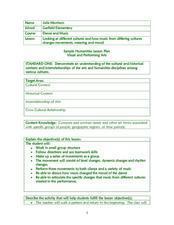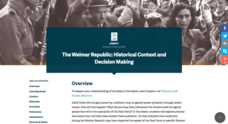Curated OER
Looking at different cultures and how music from differing cultures changes movements, meaning and mood
Each of the three dance lessons included here will get your class moving. The first lesson allows learners to explore how music and movement differ in meaning depending on cultural context. Lesson two gives them an opportunity to create...
Jamestown-Yorktown Foundation
Making a Patriot Inquiry: Are Independence, Freedom, and Liberty the Same Thing?
As part of a study of the American Revolution, class members engage in an inquiry-based lesson plan that has them watch a scene from the play Slave Spy, examine multiple primary source documents, and then discuss the similarities and...
Curated OER
Life in Old Babylonia: The Importance of Trade
Students read maps and artifacts for information indicating the existence of a trade network in Old Babylonia and beyond. They list goods imported to and exported from Babylonia. They indicate trading centers on a map of ancient...
Curated OER
On the Road with Marco Polo: From Hormuz to Venice
Students study the route from Hormuz to Constantinople that was traveled by the Polos. They explain the importance of Constantinople in medieval time and discuss its location, and outer wall structure.
Community Colleges of Los Angeles
Seeking Refuge: Understanding Refugees in Canada
What if you had no choice but to leave everything behind and seek asylum elsewhere? Do countries have an obligation to accept refugees? To gain an understanding of the complexity of the issues of refugee rights, class members first...
National Endowment for the Humanities
George Washington: The Precedent President
Everyone knows that George Washington was the first president, but do your scholars know why that was so important? The lesson plan, the third in a sequence of three, allows learners to understand how George Washington set a precedent...
National Endowment for the Humanities
Trekking to Timbuktu: Mansa Musa Takes a Trip - Teacher Version
Eleventh graders identify Mansa Musa and discuss his pilgrimage, explain how he related to leaders in the East, and describe decisions he made about his homeland. They discuss changes brought about in Mali as a result of his pilgrimage.
Curated OER
Holidays in Lands Far Away - Boxing Day
A lesson on the holiday known as Boxing Day is here for you. In it, middle schoolers read a passage about the history of the holiday, then complete some reading comprehension worksheets embedded in the plan to reinforce what they have...
Curated OER
Trekking to Timbuktu: Restoring the Past
Students investigate the environmental factors that threaten Timbuktu. Students investigate what measures are being taken to restore their mosques, and the condition of their ancient manuscripts. Students discover information about the...
Curated OER
Trekking to Timbuktu: A Center of Trade
Students conduct online research regarding the origins of the city of Timbuktu and discover why it became such an important place. Students write about the city's origins until it became a part of Mali.
Curated OER
On the Road with Marco Polo: Marco Polo in China
Students investigate who the Mongols were and where their empire was located. They research Kublai Khan and the region he ruled. They study the major products of 13th Century China.
Curated OER
On the Road with Marco Polo: Sea Voyage to India
Students examine Marco Polo's route from China to Sumatra. They investigate the geography and climate, the religions and architecture of modern Indonesia. They study the use of spices and why they were so important in medieval times.
National Endowment for the Humanities
Lesson 1: On the Road with Marco Polo: A Boy in 13th Century Venice
Learners investigate Marco Polo's life as a young boy in 13th century Venice. They analyze maps, explore various websites, complete a chart and answer discussion questions, and create a travel brochure about visiting 13th century Venice.
Curated OER
I Hear the Locomotives: The Impact of the Transcontinental Railroad
Students examine the effects the Transcontinental Railroad had on the regions through which it passed. They analyze and discuss maps, view and describe online images, and use photos and documents to develop a cause-and-effect ladder.
Curated OER
Then and Now: Life in Early America, 1740 - 1840
Students complete a unit of lessons that examine life in early America from 1740-1840. They compare items with similar objects we use today, explore various websites, create a paper doll, try and guess the function of various objects,...
Curated OER
In Old Pompeii
Students investigate the history of Pompeii and its destruction. They take a virtual field trip to the ruins of Pompeii, create a travel brochure to attract tourists to the site, and write an account of their trip.
National WWII Museum
Dr. Seuss and WWII
What famous children's author and illustrator created World War II political cartoons featuring such subjects as fascism, the war effort, discrimination, and the dangers of isolationism? The who in this story is Dr. Seuss, and what...
Curated OER
Using HyperStudio
Second through eighth graders use the software "HyperStudio" to create a presentation of their choice on Native American lifestyles. One thing I like a lot about this lesson, is that the students are the ones who get to choose and...
Curated OER
US Constitution and Connecticut
Students analyze copies of primary source documents and list similarities between the Fundamental Orders of Connecticut and the United States Constitution following a review of culture and government of the 17th century.
Curated OER
Differing Federal Responses to the Great Depression: Letter Analysis
Young analysts examine two letters, one written by President Hoover and one written by FDR. Each letter contains that president's response to the role of the Federal Government during times of crisis (The Great Depression). They analyze...
Curated OER
An Untold Triumph
Middle schoolers examine and analyze the history and experience of Filipinos in Hawaii and California. They identify the contributions of Filipino Americans to the US war effort in World War II, and analyze the many causes that led to...
Facing History and Ourselves
Us and Them: Confronting Labels and Lies
Stereotyping and discrimination based on religion catalyze many atrocities in the world. Explain the awful treatment of Jews and the lies Nazis spread by using an informative yet sensitive resource. Learners participate in a warm-up and...
Curated OER
Forty Acres? The Question of Land at the War's End
Should land be redistributed to former slaves after the Civil War? This essential question guides a lesson on the Reconstruction Era, as learners analyze primary sources (linked), recording responses on a worksheet (linked). To model the...
Facing History and Ourselves
Taking a Stand: Models of Civic Participation
How does an individual take a stand for a principle or belief? what skills are required to do so? What are the challenges and risks in doing so? Class members study examples of individuals engaging in such activities and then identify...

























